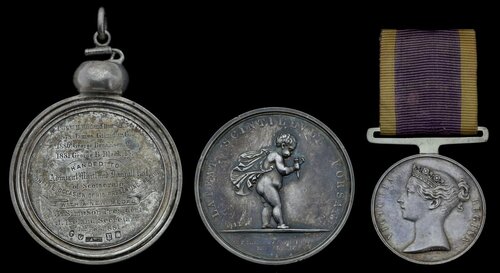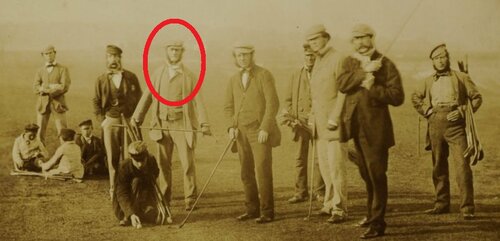Auction: 21003 - Orders, Decorations and Medals
Lot: 284
Sold by Order of a Direct Descendant
'He bids fair to rival the gallantry of his lamented uncle, that bright ornament of his profession, the late Sir Frederic Maitland'
Sir Wm. Parker, in his despatch of 1842, on the bravery of Lieutenant Maitland-Dougall at the capture of Chapoo
A superb and important campaign pair awarded to Admiral W. H. Maitland-Dougall, Royal Navy; a scion of that famous Naval family, young Maitland-Dougall distinguished himself during the First Opium War, being 'mentioned' on several occasions for his gallantry, personally leading his men in action and accounting for the enemy in hand-to-hand actions on occasion
China 1842 (W. H. Maitland. Lieut.. H.M.S. Wellesley.); Royal Humane Society, large silver medal (successful) (Capt. W. H. M. Dougall. R.N. 3 August 1852.), good very fine (2)
R.H.S. Silver Medal:
'Jumped from the pier at Dundee, on 3 August 1852, and swam out to John Swandle, aged 10, who sank whilst bathing, and brought the boy to shore.'
William Heriot-Maitland-Dougall was born on 3 July 1819 and by the time of the First Opium War was serving aboard the Wellesley, this in the command of his relative Captain Thomas Maitland, later Admiral of the Fleet Thomas Maitland, 11th Earl of Lauderdale and would surely have been present for the death of another feted relative, Rear-Admiral Sir Frederick Lewis Maitland on 30 November 1839.
Indeed, his entry in The Naval Biographical Dictionary gives perhaps the best details of his career:
'This officer entered the Navy on 16 October 1832, as First Class Volunteer, on board the Castor, Captain Lord John Hay, and in July, 1836, after having been employed on the Home station and off the north coast of Spain during the Civil War, removed as Midshipman to the Vanguard, commanded in the Mediterranean by Captains Hon. Buncombe Pleydell Bouverie and Sir Thos. Fellowes. Joining next, in June, 1837, the Wellesley, bearing the flag of his uncle, Sir Frederick Lewis Maitland, he served as Mate of that ship at the taking of Currachee in February 1839, and in her boats in a skirmish at Bushehr, in the Persian Gulf, in April of the same year. His appointments as Lieutenant, appear to have been – 10 July 1839, to the Hyacinth, Captain William Warren, 23 June 1840, again to the Wellesley, Captain Thomas Maitland, 16 October 1841, to the command of the Algerine and 20 September 1842, to the Blonde, Captain Thomas Bourchier. In the Hyacinth Maitland was in action with the enemy’s junks at Chuenpee; and, when in the Wellesley, he assisted in demolishing the enemy’s fortifications at the latter place – landed, during the attack on the Bogue Forts, in command, with Mr. W. H. Hall of the Nemesis, of a party of seamen and marines, and took possession of Little Tycocktow, spiking at the same time its guns, and destroying a neighbouring encampment – and united in the operations against Canton, Amoy, Chusan, Chinghae, and Ningpo. In the attack upon Amoy his skull was fractured and he was otherwise much injured. During his command of the Algerine we find him particularly mentioned for his conduct at the capture of Chapoo, where, after he had assisted in landing the troops, he accompanied them on their advance, and with his own hands slew two mandarins. He was also employed in the same vessel in surveying the Yang-tse-kiang, and was present in action with the Woosung batteries, and at the pacification of Nanking. On his return to England in the Blonde in March 1843. Mr Maitland found that his services had procured him a Commander’s commission dated 23 December 1842. His last appointment was on 31 January 1846, to the command of the Electra, fitting for the North America and West India station, where he remained until his health obliged him to invalid, in March 1847.'
He was mentioned on numerous occasions in Narrative of the Voyages and Services of the Nemesis from 1840-43:
'[January 1840]...Nemesis was sent to convey Lieutenant Maitland, of the Wellesley, to Anunghoy, as bearer of a chop or official document, relating to the truce, and to a projected treaty of peace, the precise terms of which did not transpire.'
In the capture of the Bogue Forts at Wantung:
'There was every probability that these would be carried without resistance, for the Wellesley had already seriously damaged the fort, by her beautiful firing of shells, in the morning, and the Modeste had also contributed to silence it. A party of the Wellesley's Marines were embarked in her own boats, about four o'clock, under Lieut. Maitland, and proceeded across, in company with the Nemesis, in order to complete the day's work. A few shots were fired by her as she approached the fort, but, finding they were not returned, the boats pushed off to land, including the boats of the Nemesis, with Capt. Hall and Lieut Pedder. The fort was found abandoned; and having taken possession of it, they advanced up the hill in the rear with all speed, as they observed a body of Chinese in disorder, close to an encampment upon the top of it. However, on the approach of the little party, they fled into the interior, abandoning their lines, magazines etc. These were all set fire to and destroyed, and the effect of the blaze, which lasted for a considerable time, becoming more vivid as the night closed in, spread far and wide, among the distant inhabitants of the country, the general panic which had already seized their troops. The conflagration extended itself on all sides, much beyond the original site of the encampment, and threw its lurid glare over the scene of slaughter and confusion of the day. Having spiked the guns in the fort, the boats returned with their crews to their respective ships.'
In the action at Woosung:
'A small party from the Algerine, under Lieutenant Maitland, boldly landed before they could be well supported, and were a little cut up.'
Having come ashore, Maitland-Dougall missed no time in taking up his free time with his favourite pastime, golf. To this day, the first hole at Scotscraig is known as 'The Admiral' whilst refreshments are given to players in the Maitland-Dougall Lounge. He was instrumental in reforming the Club in 1887 and was elected Captain; but was more than just an enthusiast. Having been founded in 1817, the course had been ploughed and thus their Members contested their Medal on the links at St Andrews. In Autumn 1860, Maitland-Dougall spotted a vessel in distress in the Bay and it was soon found the lifeboat was a man short. Maitland-Dougall took the stroke oar and was out at sea for some five hours. Returned to shore, he returned to the tee and, having added a little buckshot to his ball, shot 112 to take the Gold Medal that year. It was not his first lifesaving act, for he had been awarded a Royal Humane Society Silver Medal eight years prior. He also took ten Club Competitions at the Panmure between 1852-63.
Maitland-Dougall was advanced Rear-Admiral (Retired) on 1 January 1875, Vice-Admiral (Retired) on 15 June 1879 and Admiral (Retired) on 31 March 1885. He died on 7 March 1890.
Sold together with a silver curling Medal, presented to the Scotscraig Curling Club by his wife, dated 1881, being the prize Medal from 1853-1881, winners engraved on either side, 54mm, with a curling stone on the top and copied research.
The Maitland-Dougall Photographic Collection is held at St Andrews University.
Subject to 20% VAT on Buyer’s Premium. For more information please view Terms and Conditions for Buyers.
Sold for
£2,600
Starting price
£1200









